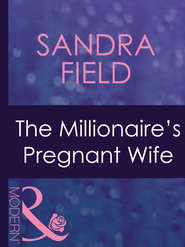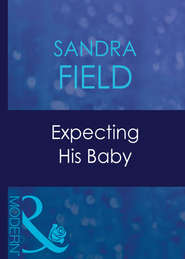По всем вопросам обращайтесь на: info@litportal.ru
(©) 2003-2025.
✖
Second Honeymoon
Автор
Год написания книги
2018
Настройки чтения
Размер шрифта
Высота строк
Поля
“Coming!” she called, and even as she opened the door was saying, “Did you forget——?”
Her voice broke off. Because the light was behind her, Troy couldn’t see the expression on her face, although her gasp of shock and her instinctive step backward were only too obvious. Pushing past her, he went inside.
She had lit two oil lamps—one beside the double bed, one on the table by the window. It took him less than two seconds to see the marks of her occupancy in the tiny cabin, none of which included a photograph of either himself or Michael. Stationing himself against the edge of the table, he said viciously, “What a cozy little setupdoes the artist go along with it?”
“Troy! What are you doing here?” Her face paled, and suddenly she stepped to meet him, her fingers digging into his wrist under his light wool sweater. “Mother—is she all right? There’s nothing wrong, is there?”
“There’s a great deal wrong, which has nothing to do with your mother or your sisters and everything to do with us.”
“You frightened me…”
He glanced down. It was Lucy’s left hand that was clasping his wrist. Her finger was bare of the narrow gold band he had given her on their wedding-day. He said roughly, “Where’s your wedding-ring? And your engagement ring?”
She jerked her hand away. “I left the sapphire in Ottawa—a busy kitchen is no place for an expensive ring.” Her gray eyes openly defiant, she added, “I took off my wedding-band before I got on the boat to come over here.”
“You left your married name behind as well. Isn’t Donovan good enough for you any more?”
Suspicion had darkened her eyes. Ignoring his question, she said, “It was a Mr Daniels who was supposed to arrive today. Not you.”
“I made the reservation under a false name,” Troy said.
She was standing so close to him that her scent drifted to his nostrils. As though this was the only cue his body needed, it sprang to life, desire shooting sparks amid his anger like fresh wood tossed on to a fire. She looked wonderful, and this, too, fueled his rage. Her bare legs and her face were lightly tanned, her full breasts pushed at her loose cotton sweater, and her hair, longer than he had ever seen it, was a thick mass of mahogany curls. When Troy had last seen her, five months ago in Ottawa, she’d been thin and pale, with hollows under her cheekbones.
The last vestige of speech, planned or otherwise, vanished from Troy’s brain. He put his arms around Lucy, pulled her against the length of his body and kissed her.
She fit. He knew her as he knew himself. She was his.
His kiss deepened, his hands rediscovering with frantic hunger the arch of her ribs, the little bump of her vertebrae where her neck met her shoulders, the labyrinth of her soft, fragrant hair. I’ve come home, he thought, his rage dropping away like a garment no longer needed.
He had felt the shock slam through Lucy’s frame when he had first touched her; she had been standing as rigid as an iron bar in his embrace. But then she began to tremble and shake, like aspen leaves in the wind, clutching his sweater as if she might fall down were she to let go. Troy parted her lips with his tongue, wanting to savor the sweetness of her mouth, aching for her to open to him like a sunflower to the golden light of morning, to bend to his touch like long grass to a summer breeze.
“Lucy,” he whispered, showering kisses on her lips, her cheeks, her throat. “Lucy, I love you so much.” And somewhere, distantly, he remembered that these words had never been part of his plan.
She shoved against his chest with a strength that jarred every nerve in his body, and wrenched her mouth free. “Let go!” she cried. “Troy, let go of me or I’ll scream the place down.”
She looked entirely capable of doing so. Trying to gather his wits, which were scattered like confetti at a wedding, Troy said urgently, “You felt it, too, Lucy—you must have. It was like coming home after a long absence to the one you never meant to leave. It couldn’t only have been me who felt that way—tell me it wasn’t!”
“I don’t want to go home!” she cried, in a voice raw with pain. “Why do you think I left in the first place? Because I couldn’t bear it—because it was killing me.”
“Say it, why don’t you?” he rasped. “Because I was killing you—that’s what you mean, isn’t it?”
Behind the question lay all the pain of their last six months together. Because if Lucy had withdrawn from her clients and her friends, she had also withdrawn from Troy, in a way that had devastated him.
In the first few days after the baby had died Lucy hadn’t cried at all. Stunned, blank-faced, she had wandered around the house like a lost soul. Then one day a neighbor who had been away had innocently asked after him and Lucy had broken down, shutting herself in the nursery and sobbing for hours at a time. Although Troy had done his best to comfort her, he had been fatally hampered by the rawness of his own grief, and, without him being quite sure how it had happened, her withdrawal had become a pattern that he’d never been able to break.
Worst than that, though, had been Lucy’s refusal to make love with him—her almost hysterical repudiation of the intimacy that had bound them together. At first Troy had understood. Even though he had been struggling, for her sake, to keep his own emotions under control, for days at a time, and from moment to moment, he had lived on the very edge of falling apart; and he had sensed the same fragility in Lucy. But later, when he had gone to her for consolation, desperate for a physical closeness that might keep the blackness of his sorrow at bay, she had struck him away.
She was afraid of getting pregnant again, or so she had said; she couldn’t bear to start another baby. It had made sense, and Troy had believed her. However, as week after week had passed, and she’d continued, stony-faced, to reject him, Troy had begun to doubt the rapture they had once shared, and even the love that bound them together; the woman who was his wife had become a woman he no longer knew. And that had been the cruelest cut of all. Lucy, his beloved wife, had turned into a stranger.
Shaking his head like a wounded animal, Troy came back to the present. Lucy had stepped away from him, perhaps frightened by something in his face, her body rigid with tension. She said, “I stayed away just so we wouldn’t go on hurting each other like this.”
“You’re a coward, Lucy.”
She flinched. Then, raising her chin, she said, “Maybe instead I know when to let go.”
It was Troy’s turn to flinch. His naïve assumption that he might have fallen out of love with Lucy had vanished without a trace at the very first sight of her; if anything he loved her all the more. That he had even considered the possibility of his love being dead seemed laughable in the unalterable fact of her presence. Let go of her? He couldn’t. He wouldn’t.
He might have to. She had taken off his ring and was no longer using his name. She had pushed him away when he’d kissed her. She had—to use her own wordslet him go.
Then she said, and there could be no mistaking her sincerity, “Troy, I don’t want to cause you more pain. Can’t we start this conversation over again?” She swallowed, the small movements of her throat filling him with frenzied longing. “Where did you come from? And why did you come?”
The table was hard against the backs of his thighs. Troy wrapped his fingers around the curved wood to keep himself from touching her and said harshly, “I came from Vancouver, which is where I happen to live—remember?”
Because the door to the cabin was still open a fraction, small brown moths were fluttering at the threshold. Lucy went to close the door, then leaned against it, visibly needing its support. “Why are you so angry?”
She had kissed Quentin, and laughed with him in the intimate darkness in front of her cabin. But Troy she had pushed away. “Oh, I’m not angry,” Troy said sarcastically. “I just love seeing you with another manpromising to make him muffins, for Pete’s sake—when for the last four months you haven’t even done me the courtesy of a phone call to let me know where you are.”
“We’re separated,” she said mutinously, pushing her hands in the pockets of her blue shorts.
He looked at her in silence. Her face was almost as well known to him as his own. Her cheeks were flushed, her features given character by the imperious bump in her nose and by her brows, dark as the wings of a bird. Her eyes were, like his own, gray, although in certain lights they swam mysteriously into depths of blue. “Separation must agree with you,” he said deliberately. “You look better than you have since Michael died.”
“Don’t!” she said in a choked voice.
Troy fought for control, bunching his knuckles against the table. But for far too long his feelings had been cooped up inside him, and the sight of her—so beautiful, so sorely missed, so unattainable—was more than he could stand.
“Don’t, what? Don’t mention Michael’s name?” he flared. “Pretend he never existed? We both know better than that, Lucy. We know his death was the reason you moved out on me.” Not for the life of him could he have disguised the anguish in his voice as he added, “You don’t even have a photo of him here…Do you hate him so much for dying?”
“I loved him too much to ever hate him for anything,” she whispered. “I’m trying to forget what happened——”
“Forget Michael?”
“I’m trying to accept his death, to move on—that’s why I keep my photos of him out of sight.”
“Move on with Quentin? Is that the plan? How clever of you to have taken off your wedding-ring before you got here.”
“Troy, you can’t push your way in here and start throwing accusations at me. Nothing gives you that right!”
“I do happen to be your husband,” he said, with deadly calm. “Or are you trying to forget that, too?”
“How can I? You won’t let me!”
He took a deep breath. “You asked why I came here. I came to offer you a choice. Either we live together as husband and wife or I want a divorce.”
Her eyes widened and her whole body tensed, like a sparrow who, safe in its hedgerow, had suddenly sighted a hawk perched on a nearby branch. She stared at him blankly while the slow seconds ticked by, and for the life of him Troy couldn’t have guessed what she was thinking. Then she said, her voice not quite steady, “That sounds more like an ultimatum than a choice.”
“You can call it what you like. I’ve gone on long enough being neither one thing nor the other—I’m not married because you refuse to live with me, but I’m not divorced either, so I’m not free to pursue any other options.”
“Other women, you mean,” she flashed.











